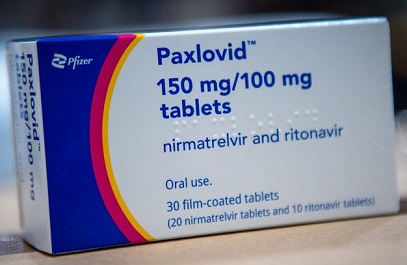COVID-19 News: University Of California Study Finds That Paxlovid Does Not Reduce Risk Of Long COVID In Vaccinated Individuals!
Nikhil Prasad Fact checked by:Thailand Medical News Team Jan 05, 2024 2 years, 2 weeks, 2 days, 15 hours, 32 minutes ago
COVID-19 News: The fight against the COVID-19 pandemic has been marked by numerous developments in treatment options, each aiming to alleviate the severity of the virus and its aftermath. As the world grapples with the ongoing challenges posed by the virus, researchers from the University of California, San Francisco (UCSF) have delved into the effectiveness of the prominent COVID-19 treatment Paxlovid in preventing the occurrence of long COVID. The findings of this study provide a comprehensive examination of the impact of these medications on individuals who have been vaccinated against COVID-19.
 Paxlovid
Paxlovid's Journey: A Closer Look at Long COVID
Paxlovid
Paxlovid's Journey: A Closer Look at Long COVID
Paxlovid, a widely-used treatment for COVID-19, has demonstrated its efficacy in managing acute infections, particularly among high-risk unvaccinated individuals. However, the UCSF study focused on a distinct cohort - vaccinated, non-hospitalized individuals - and their susceptibility to long COVID despite receiving Paxlovid treatment. The results, somewhat unexpectedly, revealed that Paxlovid did not significantly reduce the risk of long COVID in this particular group.
To unravel the intricacies of Paxlovid's impact on long COVID, the study team selected participants from the UCSF COVID-19 Citizen Science study who tested positive for COVID-19 between March and August 2022, were vaccinated, and did not require hospitalization during their infection.
A follow-up survey conducted in December 2022 aimed to gather comprehensive information on long COVID symptoms, COVID rebound symptoms, and the duration of positive test results.
The findings of this study indicated that individuals treated with Paxlovid exhibited similar long COVID outcomes as those who did not receive the treatment. Surprisingly, 16% of individuals treated with Paxlovid reported long COVID symptoms, a marginal difference compared to the 14% observed in untreated individuals.
Furthermore, the study brought attention to a higher-than-expected rate of COVID rebound among those who took Paxlovid. Rebound symptoms were reported by 21% of individuals who experienced symptomatic improvement during Paxlovid treatment. However, intriguingly, the study did not find a significant association between post-treatment rebound and the occurrence of long COVID symptoms.
The study’s first author, Dr Matthew Durstenfeld, MD, MAS, a cardiologist and UCSF assistant professor of Medicine told
COVID-19 News reporters, “We found a higher proportion with clinical rebound than previously reported but did not identify an effect of post-treatment rebound on long COVID symptoms. Our finding that Paxlovid treatment during acute infection is not associated with lower odds of long COVID surprised us, but it is consistent with two other rigorously conducted studies finding no difference in post-COVID conditions between 4 and 6 months after infection.”
Discussion and Nuanced Understanding
The implications of these findings are profound, challenging the ass
umption that antiviral treatments, such as Paxlovid, significantly reduce the risk of long COVID in vaccinated individuals. While these such medications have demonstrated claimed effectiveness in treating acute COVID-19 symptoms, the intricate relationship between their usage and the prevention of long-term complications remains uncertain.
The study prompts a closer examination of the controversial issue of rebound symptoms after antiviral treatment. Despite a higher-than-expected rate of rebound, the study highlights that there was no discernible link between post-treatment rebound and an elevated risk of long COVID symptoms. This insight is crucial as the medical community seeks to refine treatment strategies and enhance understanding of the virus's long-term consequences.
Furthermore, the study's inclusion of patient-reported symptoms as opposed to relying solely on electronic health records (EHR) and ICD-10 diagnostic codes adds a layer of depth to our understanding of long COVID. Patient-reported symptoms provide a closer approximation of the condition of interest, offering valuable insights into the lived experiences of individuals dealing with long-term effects of COVID-19.
Conclusion and Future Implications
As we navigate the evolving landscape of the COVID-19 pandemic, the UCSF study adds to the growing body of knowledge surrounding the complex interplay between antiviral treatments and long COVID. The findings underscore the need for continued research to refine treatment strategies and enhance our understanding of the virus's long-term consequences.
Moving forward, it becomes increasingly evident that a nuanced approach is necessary in the pursuit of effective treatments for COVID-19. The study's revelations about Paxlovid challenge conventional assumptions, urging the medical community to reevaluate treatment strategies and consider alternative approaches to address the multifaceted challenges posed by the virus.
In the quest for answers, ongoing and planned clinical trials will play a crucial role in shedding light on the effectiveness of these treatments in managing and potentially treating long COVID. As we await further insights, the study stands as a milestone in our collective effort to comprehend and combat the multifaceted impacts of the COVID-19 pandemic.
The study findings were published in the peer reviewed Journal of Medical Virology on January 4, 2024.
https://onlinelibrary.wiley.com/doi/full/10.1002/jmv.29333
For the latest
COVID-19 News, keep on logging to Thailand Medical News.
